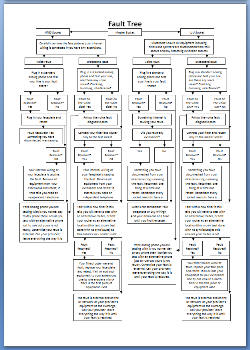
How To Report A BT Line Fault
I'm Not With BT?
No matter who you pay for your phone service, BT, TalkTalk, Tiscalli, AOL, Sky & O2 etc.. They all use the BT network which is maintained by BT Openreach only.
So if you have a fault on your line it wont go away by moving provider. you'll just have to start at the beginning again, so if you are unhappy and want to migrate get your fault fixed first.
So What To Do First?
Check Your Equipment Or Get BTfix To Do It
It is important to check your equipment. The advisor on the other
end of the phone will ask you if you have done this. If you have two
telephones on the same line, one faulty one (such as not ringing, or
dead) will affect the other one, even though there's nothing wrong
with it. They are like cheap Christmas tree lights in that way*1.
Hint: 90% of all faults reported on residential lines are caused by
faulty telephones or faulty extensions.
To check your equipment
-
Step 1: Unplug all telephones, modems, digital TVs and anything else plugged in to the line. Wait a minimum of 20 minutes then try the telephones one at a time in the main socket.
-
Step 2: If this hasn't fixed the problem, unplug everything again. If your main socket has a horizontal line embossed into it with the socket and two screws below it, you have a NTE5 linebox. (If you are in doubt STOP as if you have a standard box you cause damage which may then become chargeable by BT Openreach) Remove the screws and gently pull the bottom part away. Inside is another socket, called the test socket. Plugging a telephone into it will isolate all extensions in the house. If the line is still faulty, it is a line fault and will need an engineer.
-
If you don't have a NTE5 linebox, then your main socket is a master socket and your phone service provider may hold you accountable for any faulty extensions. The visiting engineer will replace it with NTE5 linebox, however Openreach are not responsible to fix the extensions. BTfix can reconnect and test your internal sockets.
What's Yours Is Yours, What's Mine's My Own
Unless you have rented extensions from the telephone service
provider, the only equipment the telephone service provider has in
your house is the main socket and the wiring from it leading
outside. There may be a few junction points in addition. Any other
extension sockets / wiring are most likely your own property or that
of the property owner and your telephone service provider cannot fix
it for free. There will be a callout charge plus hourly rate.
In short, try to be sure before you call whether the fault is on
your main socket or an extension.
Your Rights
Phone service providers send you a copy of your rental agreement -
believe it or not, some even send you a copy of it with every bill.
It is printed on page two and contains all the details of the
service care provided. To simplify it, the agreement should document
a couple of main items:
-
Their responsibilities: If your line goes faulty your service provider will make every effort to repair it as quickly as possible. If they are unable to repair the line by the end of the next working day, you are entitled to compensation (see below for an explanation of this).
-
The customer's responsibilities: The customer must not do anything to the line that will result in damage (such as smash the socket, cut the wire or install equipment that is not recommended to work with the rented phone line). To put it simply; if the fault is caused by something the customer did to the line, be it accidental damage, sabotage, badly installed extensions or faulty telephone equipment, the company may charge the customer for the engineer visit and repair time as separate items*2.
Reporting the Fault
Some service providers off their own customer support lines. So, for
example, BT allow you to call 151 from a BT landline or 0800 800 151
from a non-BT line or mobile*3.
Other providers provide similar free phone or low-cost numbers for
customer support and it makes sense to call the one pertaining to
your service rather than assuming BT can sort out a problem with a
line from another company.
Hint: If possible, do not call from the faulty line.
The reason is that the advisor must test your line and cannot do
this if you are on it. If you are on the faulty line, the advisor
will arrange for a call back which can take between 1 - 2 hours.
ACE - (Automatic Customer Interface)
Every time you phone BT and hear that female voice asking you to
push her buttons, you are talking to ACE. ACE is an automatic,
highly customisable interface used by all departments. Remember, if
you are suffering, so are the BT people, they have to use it for
internal calls as well. Other companies will have their own version
of this.
Hint: For those who prefer not to battle through the maze of
touchtone menus, there is an option right at the start to queue
directly to speak to an advisor.
Type Of Fault
-
NDT - No Dial Tone - Line is dead.
-
BNR - Bell Not Ringing - Telephone does not ring when called.
-
PET - Permanent Engaged Tone - Line acts engaged when it is not.
-
NU - Number Unobtainable - All out going calls get "The number you have dialed has not been recognised.
-
ESF - Exchange Select service Fault - A select service is not working.
-
CO - Cutting Off - Line cuts off during calls.
-
NSY - Noisy - Line is noisy.
-
BR - Bells Ringing - Bells ring continuously.
There are more types of fault, but those are the most common. Try to
identify the main problem you are experiencing. This will
avoid confusion and possible delays in repairing the line.
What To Say To the Advisor
Don't say 'I have a faulty line'. It's kind of obvious. The dialogue will start like this:
BT: 'Good morning you're through to BT faults, my name is Joe. Can I have you phone number please?'
Customer: '01555-555-5555'
BT: 'And can you confirm your name and address?'
Give the advisor your name, initial, house number, street name and town/post code, all information that is used as validation that you are who you say you are. They will then ask how you they can help.
Hint: Don't say 'Well you can fix my line for a start'. It's not big and it's not clever and it's not the first time the advisor has heard it. It puts their back up.
Hint: Try to remain calm at all times. The advisors are being professional and courteous to you. Pay them the same respect.
Describe the fault in your own words and as succinctly as possible. Don't drag the explanation out any more than necessary. Now is the time to mention any engineers seen in the area, lightning storms, dogs chewing the cable or kids messing with your outside wiring.
Things Not To Ask
-
Are there any faults in the area?
-
I've been away on holiday, how long has my line been dead?
-
Why can't BT Openreach test every line every day to check for faults?
The advisor will not be able to answer these questions.
Keep It Civil
Do not shout at the advisor. It's not their fault your line is faulty. It's not their fault you have had to wait a long time. It's not their fault you don't like using Automated interfaces, such as the one already discussed*4
.Hint: Never swear at the advisor. They will terminate the call. Contrary to public opinion, advisors do not have to put up with abusive customers, people who swear, people calling to waste their time or people who will not
*5 describe their fault and simply evade the question.Have Realistic Expectations
Your service provider is not going to fix your fault in the next five minutes. The earliest time they will possibly respond is going to be tomorrow.
Your service provider is not like every other utility (electricity, gas, water) because those companies have an obligation to provide service to you. In contrast, you have asked your service provider to provide service to you. You are their customer, not its keeper.
Hint: Don't wait until your line is faulty to tell your service provider that you have a heart condition or a panic alarm in the house, or have a terminal illness. Ask about their services for disabilities when you initially sign up (for example, BT has a 'Chronically Sick or Disabled Person (CSDP) registration form', which can be sent to you). Your fault advisor cannot take your word for it when you call to report the fault if you haven't previously notified them that you have special (potentially life-threatening) circumstances.
Don't tell the advisor that your line has been faulty for six days but are only now reporting it. The advisor cannot back-date your fault.
Additionally, having a burglar alarm attached to the line does not obligate them to repair your line any faster.
Business Lines and Service Care
Don't tell the advisor you are using a residential line for business use. It won't affect the ERT
*6. If you run a business from home, get a business line, or pay the extra (and it's not that much) to improve the service care.Remember: This means the engineer will get to the fault; it is not a guarantee that the engineer will be able to fix it straight away. If it is dark, or if the weather conditions are not suitable, the engineer will not climb poles or open manhole covers.
If You're Still Not Happy
Customer Service AKA Compensation
It is unrealistic to expect your provider to pay out hundreds of pounds in compensation for your line being faulty. There are three general types of compensation you can expect:
-
A rebate based on your daily rental charge
-
A compensation according to a fixed rate
-
A compensation according to an actual financial loss on your part
The first can be worked out for people who have accepted a divert to another number, like their mobile. In the case of the company referred to for this entry, this means that the company reimburses the line rental for each day the line is faulty plus 1 per day if diverted to a mobile. However, it only calculates for weekdays and does not include the first 24 working hours.
The second option is for people who did not have a divert. It offers a fixed amount of compensation, so for example, they might offer one month's line rental back if the fault is 1 - 3 days long, two months for 4 - 6 days, up to a maximum of 4 months line rental. Options one and two are usually mutually exclusive. You cannot have both.
The third option is an additional amount that can be claimed in addition to either of the first two. It is for people who can prove their fault cost them financially. It is usually only for businesses. There are two things about this option that are important to remember:
-
The compensation forms for this option are fairly complex to fill in. Most people who ask for them never bother to return them.
-
You cannot claim for business loss if your line is a residential line. The line rental for residential is cheaper for a reason.
None of these forms of compensation will pay out until the line is repaired and back in service. Compensation is not available if the customer cancels the fault report.
Complaints
Your provider will have a set complaints policy and they will expect you to follow it; it is highly unlikely that you'll be able to jump up to the most senior manager straight away - he or she will simply refer your complaint back down the line if the proper sequence hasn't been adhered to. A typical sequence is as follows:
-
Talk to advisor. Still unhappy, talk to manager/supervisor
-
Manager/supervisor. Still unhappy, talk to office manager.
-
Office manager, in charge of all faults managers in the building. Still unhappy, talk to site manager.
-
Site manager, responsible for all personnel in the building or group of buildings. Still unhappy, talk to high level complaints.
-
High level complaints. Special department in the company. Still unhappy, talk to OFCOM.
OFCOM. Highest complaints authority. Deals with complaints that used to be dealt with by OFTEL until OFCOM superseded it.
There is no point telling the advisor that you will take the matter to OFCOM. The first thing OFCOM will ask is 'Have you followed the provider's internal complaints procedure?' Once you admit you have not, they will pass you straight back to the provider. They cannot deal with the complaint until you have exhausted all of the provider's internal procedures.
Do not threaten a lowly advisor that you will leave the provider if the line isn't fixed or your complaint not addressed. The advisor will respond by saying:
That's entirely your prerogative. Of course we will be sorry to see you go. Shall I transfer you to the appropriate department to arrange cessation of service?
It is not that uncommon for a customer to be so irate that they say yes, and before they know it, they are no longer a customer of that company7.
And Finally...
Remember: Having your phone out of service is not the end of the world. There are many things worse than that in the world.
One provider has estimated that, on average, a typical customer contacts them only once every four years.
Repeat the mantra: 'It's only a phone line, it's only a phone line...'
Do not threaten a lowly advisor that you will leave the provider if
the line isn't fixed or your complaint not addressed. The advisor
will respond by saying:
That's entirely your prerogative. Of course we will be sorry to see
you go. Shall I transfer you to the appropriate department to
arrange cessation of service?
It is not that uncommon for a customer to be so irate that they say
yes, and before they know it, they are no longer a customer of that
company*7.
*1
You remember; one bulb blows and they all go off and you have to
spend ages figuring out which one?
*2
For example, a call out charge plus an hourly rate.
*3
Your mobile service may charge you for the call.
*4
BT's research shows 60% of all customers use their system, ACE, and
90% of those never want or need to talk to an advisor.
*5
There is a strong distinction between those who cannot and
those who will not describe their fault.
*6
Estimated Response Time - The date the provider expects to get to
your fault.
*7
Bottom line is, don't bluff with your provider. Often, the advisors
are obligated to treat everything you say as genuine, which in the
case of a bluff could backfire on you.
Download my Fault Self Help Guide for only FREE
My Fault Self Help Guide is very useful and it will save you lots of time on the phone and possibly a lot of money too, It completly FREE. Donations are welcome to contribute to the knowledge, time and effort that went into creating it.


